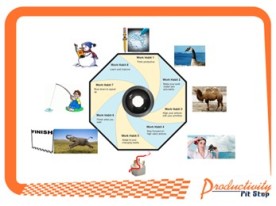I am so glad that I met Kevin Horsley, international grandmaster of memory and author of Unlimited Memory: How to Use Advanced Learning Strategies to Learn Faster, Remember More and be More Productive, a few years ago and that we could catch up over a cup of coffee on Friday.
I mentioned our new “8 Basic Work Habits That Will Skyrocket Productivity” workshop to him. He asked me what the habits were and I named them. “That’s only seven”, Kevin said when I was “finished”. I forgot “Finish what you start”!
In the next 5 minutes he helped me to use a method (“number-shape pegs”) to remember the habits very easily by associating information I already know well (the numbers 1 to 8) with new things I want to remember, e.g. the names of the habits by associating it with the numbers using a very vivid picture of what the number represents.
Check it out below.
| Number (of habit) | Shape | See the shape as vividly as possible (weird and wacky imagery allowed!) | Description of habit |
| 1 | Pencil | Pencil writing in a brain | Think Productive |
| 2 | Swan | Swan on misty lake, wearing glasses with wipers so it can see clearly | Clarity: Make your work visible and actionable |
| 3 | Camel (Two humps on its back in the shape of a 3) | Camel walking on a red line | Alignment: All actions must be aligned with one’s priorities |
| 4 | Boat sail | People on a boat all looking at a whale while all the time focusing their binoculars | Focus: Stay focused on the task at hand and avoid distractions and interruptions |
| 5 | Snake | Snake sliding through an electric adaptor plug | Adapt when priorities change |
| 6 | Elephant (with trunk above its head) | Elephant storming through the finish line | Completion: Finish what you start |
| 7 | Fishing rod and line | Lazy guy relaxes and takes time out fishing and just very slowly reels in the catch | Slow down to speed up |
| 8 | Snowman | Snowman reading a book | Learn and improve |
This method is particularly useful to remember lists of things, and here is how I will use it to help people in our workshops remember the 8 basic work habits very easily:
Here are the associations (pardon my handwriting!):
Thanks, Kevin! Oops, what is habit 6 again…ah, the elephant finishing!
If you have to/want to remember any list, try this method – it works.
Quote: “Happiness is nothing more than good health and a bad memory.” – Albert Schweitzer
What’s happening: “Productivity Breakthrough: 8 Basic Work Habits That Will Skyrocket Your Productivity” public workshops for Outlook users in Bloemfontein (7 October), Johannesburg (14 October, 8 December), Durban (4 November), Upington (11 November) Cape Town (18 November), or invite us in-house.
Remember to have fun this week!



 ain menu (as you can see in the picture) was torn and dirty and the other menu (drinks or desserts) was dirty on the outside and on the inside it had so much dirt and “stuff” sticking together that I could scarcely open it. I called the server and asked her what would go through her mind if she received menus like these when visiting a restaurant and she said “What else is broken and dirty here?” My thoughts exactly. If they care so little about the state of their menus, what does the kitchen look like, and the chef, their system to supply and deliver food… Trust is replaced with doubt and suspicion. Have a quick look at the space on and around your desk. Imagine you were looking at someone else’s desk – someone you do not know. You are looking at their “menu”.
ain menu (as you can see in the picture) was torn and dirty and the other menu (drinks or desserts) was dirty on the outside and on the inside it had so much dirt and “stuff” sticking together that I could scarcely open it. I called the server and asked her what would go through her mind if she received menus like these when visiting a restaurant and she said “What else is broken and dirty here?” My thoughts exactly. If they care so little about the state of their menus, what does the kitchen look like, and the chef, their system to supply and deliver food… Trust is replaced with doubt and suspicion. Have a quick look at the space on and around your desk. Imagine you were looking at someone else’s desk – someone you do not know. You are looking at their “menu”. 